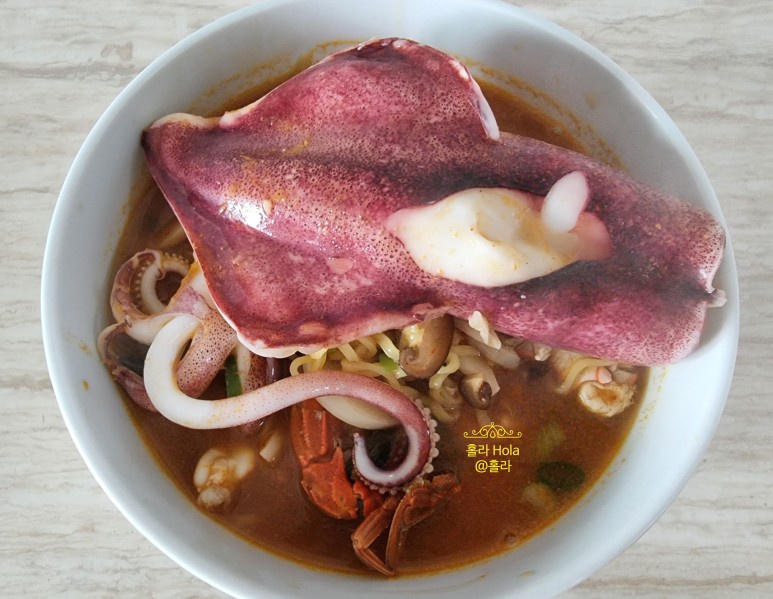Spicy and Refreshing Squid Noodle Soup
How to Make Delicious Squid Ramen, Including Squid Preparation

Squid (or ojingeo) is in season and readily available at markets and supermarkets, often at great prices. Don’t miss out on trying this incredibly flavorful squid ramen, which is even better than jjampong! This recipe includes detailed instructions on how to prepare fresh squid.
Ingredients for Squid Ramen- 1 fresh squid
- 1 Cheongyang chili pepper, finely chopped
- A small bunch of green onions, finely chopped
- 2 cloves garlic, thinly sliced
- 2 blue crabs (or other small crabs), cleaned
- 2 packs Shin Ramyun dry noodles (use dry noodles, soup base, seasoning packet, and vegetable flakes)
- Water (as needed)
- 3 Tbsp kimchi brine
Cooking Instructions
Step 1
First, let’s prepare the squid. Rinse it lightly under running water. Hold the body and gently pull towards the head; the innards, along with the bone, will come out easily.

Step 2
Remove the bone that came out from the body. This transparent, thin bone is usually discarded as it doesn’t add to the texture of the ramen.

Step 3
Cut off and remove the gill area of the squid. Even with fresh squid, removing this part ensures a cleaner taste.

Step 4
If there are any remaining innards inside the body cavity, insert your finger and push them out completely. This step is crucial for a clean flavor.

Step 5
Rinse the squid’s body and tentacles thoroughly under running water. This removes any residual impurities.

Step 6
Use scissors to carefully trim away any remaining innards or membrane from inside the squid’s body. This will make the squid much cleaner.

Step 7
To ensure a tender texture, gently rub the tentacles with your hand to remove the suckers. This step is recommended for a better eating experience.

Step 8
Carefully remove the eyes of the squid using a knife or scissors. Cleaning the dark area around the eyes will make it look more appealing.

Step 9
The squid’s beak is hard and sharp. Use a knife or scissors to cut it out from the center. Be careful to remove it completely.

Step 10
If you find any small bones or hard parts during preparation, remove them now. Double-check to ensure a perfectly clean ramen.

Step 11
After all the preparation is done, rinse the squid again and drain it in a colander. It’s now ready for cooking.

Step 12
In a pot, bring water to a boil. Add the kimchi brine (3 Tbsp) and sliced garlic (2 cloves). This forms the flavorful base for your ramen.

Step 13
Once the broth is boiling, add the cleaned blue crabs (2). They will add a wonderful depth and seafood flavor to the soup.

Step 14
Add the vegetable flakes from the Shin Ramyun dry noodle pack first. This helps the flavors infuse into the broth.

Step 15
Next, add the seasoning powder packet and stir well to dissolve. This is key to achieving that rich, spicy broth.

Step 16
Finally, add the liquid sauce packet and let it simmer briefly. This ensures all the seasonings blend harmoniously.

Step 17
When the broth is boiling nicely, add the 2 packs of Shin Ramyun dry noodles. Dry noodles cook faster, so keep an eye on them to prevent them from getting mushy.

Step 18
When the noodles are almost cooked, add the prepared fresh squid. Squid can become tough if overcooked, so cook it only briefly to maintain its tender, chewy texture.

Step 19
In the final step, add the chopped green onions and Cheongyang chili pepper. The green onions add freshness, and the chili peppers provide a nice kick.

Step 20
Serve the finished squid ramen in a bowl. You can garnish with extra chopped green onions or enjoy it with your favorite side dishes for an even better meal.



